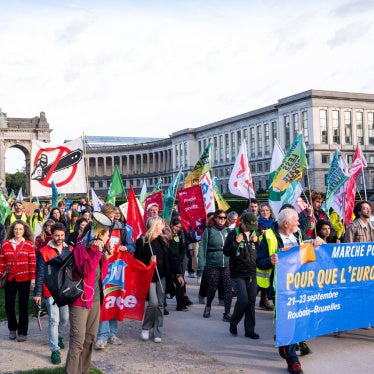Dear Ambassador,
We write with urgent concern regarding the latest Omnibus I proposal presented by the Polish Presidency to the Council. We believe the pressure put on Member States to agree to a lowest denominator compromise fundamentally endangers the purpose, spirit and effectiveness of the Corporate Sustainability Due Diligence Directive (CSDDD).
We are urging you, at the upcoming General Affairs Council (June 24th) to oppose the latest proposal and push for a continuation of the negotiations under the Danish Presidency to guarantee a directive that effectively protects human rights and the environment in the global value chains of corporations.
A. Ensure a meaningful risk-based approach across the whole value chain
Maintaining a flexible risk-based approach to identifying and assessing risks across the entire chain of activities is necessary to enable companies to focus resources on actual harm prevention rather than on fulfilling administrative requirements. Key elements coming out of recent research and court cases show that:
- Comprehensive risk scoping across the whole value chain ensures companies identify areas where adverse impacts are likely to occur, not just in direct business relationships (tier 1).
- Evidence shows that restricting focus to direct business relationships overlooks 91% of significant risks, while not significantly reducing corporate compliance costs.
- Experience from the German supply chain law shows that focusing on Tiers 1 increases the bureaucracy, in particular for SMEs, and limits the relevance and effectiveness of the process.
- The recent court case against La Poste under the French Loi de Vigilance reiterated that risk identification and assessment must be specific and tailored to a company’s activities and operations - not generic, and that the risk mapping must focus on the risk of serious violations, prioritizing those most likely to occur or most likely to result in severe consequences.
B. Include companies with +1,000 employees and a turnover of €450 million or more
The latest proposal drastically limits the scope of CSDDD to companies with +5000 employees and a turnover of €1,5 billion or more. Estimations by SOMO under its CSDDD data hub shows that the number of companies under scope would be reduced by 72.5%, excluding most large companies operating or based in the EU.
We urge you to keep the original scope of the CSDDD, which proposed a phase-in over several years, starting with +5,000 employees and a turnover of €1,5 billion or more and then including gradually more companies over a process of two years until all those with +1,000 employees and a turnover of €450 million or more are in scope.
C. Strengthen climate transition plans
The preservation and strengthening of Article 22's climate transition plan is an essential requirement to support Europe's climate resilience and prevent catastrophic climate-related human rights impacts in the future. Financial institutions, including the European Central Bank, have emphasized that clear legal obligations for implementing transition plans in CSDDD are essential for meaningful risk assessment and investment decisions.
We urge you to advocate for the retention of Article 22.
D. Provide certainty through a civil liability framework
Removing Articles 29(1) and 29(7) creates legal uncertainty as it exposes companies to potentially hundreds of divergent legal regimes worldwide, directly contradicting the Commission's stated goals of harmonization and simplification. Article 29(1) is crucial to prevent the fragmentation of liability standards across Member States, thereby preventing legal fragmentation and an uneven regulatory playing field within the European Union (EU). It would also guarantee consistent protection and redress mechanisms to victims throughout the Union, regardless of where they sue a company. Article 29(7) is needed to ensure the effective and uniform application of EU law regardless of where harm occurs.
Keeping Articles 29(1) and 29(7) is crucial for making the CSDDD deliver real human rights and environmental due diligence, preventing legal fragmentation across the EU, and protecting victims' rights in corporate value chains. Ensuring the Directive serves as an effective tool for responsible business conduct and corporate accountability, rather than a symbolic measure, requires a harmonized liability framework as a cornerstone of the CSDDD, not as an optional element.
We urge you not to yield to unnecessary and counterproductive time pressure and to prioritize sound and evidence-based discussions with the aim of ensuring the directive achieves its protective and regulatory objectives, including legal certainty across all Member States.
Yours sincerely,
Claudio Francavilla, Acting EU Director, HRW
Benedicte Jeannerod, France Director, HRW
Philipp Frisch, Germany Director, HRW








